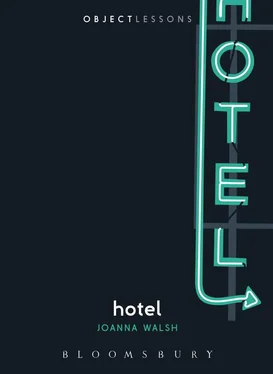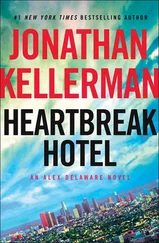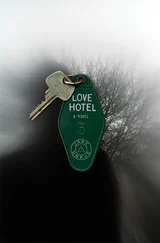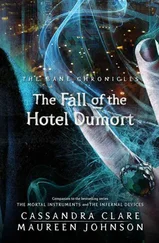FREUD
From my time in Charcot’s clinic I remembered seeing and hearing that among people with hysterical mutism, writing vicariously stood in for speech. They wrote fluently, more quickly, and better than other people did. 1
In the drawer in the faux-leather-topped desk in my hotel room, is a faux-leather folder. Inside, blank pages with the hotel’s address, a single envelope, and one postcard showing the hotel’s facade. Here I am on the inside of the hotel, which cannot be seen on the postcard. A temporary address, I am safe. I’m not giving anything away.
People write from hotels. Once there, what else is there to do?
Postcard #2—Writing
(This postcard shows the front of the hotel, which is tipped at an angle so the entire facade can be included.)
FREUD
If I were inventing, as a writer, such a mental state for a novella.
Here in the hotel, it is difficult to think what was bad about home. To turn over the bad bits is still surprising.
There are a lot of facts, all contradictory, as facts are.
A lot of opinions, then?
Yes, even within the same heads.
As soon as I leave home, I can’t remember what happened there.
I write the words over, and the facts change.
I do not know how to put them in order. I do not know if these things can be ordered.
I do not know exactly what it is I know.
I do not know exactly what it is I’ll write.
Since I left, I have felt my honesty changing completely. I begin to forget what happened. How much you — I — did wrong. Perhaps it was not so very much. Perhaps it was as little as I would have liked, nearly as little as is conversant with what would have been acceptable. Yes, I did not do wrong things very often, though when I did, it was with a purpose, which I can define, not with the need to possess all of you, to get right inside the wrong things that you were doing. Which is of course what I did want.
What did I want?
Was it ever only one thing?
Postcard #3—Silence
(This postcard does not show the hotel at all, but a nearby monument and, printed underneath, the name of the hotel.)
Marriage functions so two people live beside each other in ways that allow them not to touch or communicate too directly, in quiet.
Inquiet.
Dora wrote a message she did not send. Her parents found a letter “in or on the girl’s desk, in which she bade them farewell because her life had become unbearable.”
DORA
It was locked in my desk.
FREUD
I conclude that she had played it into their hands herself.
I leave my g-chat window open, in case you want to get in touch.
Sometimes, when it looks like you’re there, you don’t answer.
I never wanted the strong and silent type.
I have to learn to shut up.
If I don’t talk, if things went on as before, you would forgive me.
But I don’t want things to go on as before.
Not speaking, we go on, somehow, still, sometimes using words.
Your green light has gone. You have safely logged out. I’m safe now, safe from my desire for you, which I no longer at any point desire.
To speak to you is immediately to feel anxious I’ve said the wrong thing.
Perhaps because I have.
If I express a desire aloud, I immediately think someone will stop me.
Postcard #4—Dora time
(This postcard shows the intimate view of the hotel’s interior court from the eye level of a swimmer in the hotel pool.)
DORA
[I] asked about a hundred times, “Where is the station?”
EVERYONE
Five minutes.
Dora dreams she is trying to get to the railway station. She asks for an answer in streets, she is given an answer in minutes. Space presents as time. Home is a matter of years. Sometimes when I’m temporary, my eye lifts to the hotel cornicing and meets an architrave, unexpected. When I get used to this, it seems odd to wake up in the same place every day.
Time is particularly important in A Case of Hysteria —fourteen days, two and a half hours, nine months — but locations — a spa, a town, a railway station — are imprecise.
DORA
(Dreams)
I am going for a walk in a town I don’t know. I see streets and squares that are strange to me.
Why so precise about time and so vague about place?
“Where do you want to go this weekend?” you used to ask me sometimes. That’s a question I never asked myself. My time was taken up with all the things I had to do. Now I can go anywhere.
Postcard #5—Clock time
(This postcard does not show the hotel, but the view from the hotel, across the harbor.)
When you are on the other side of the world from me, when, sometimes, you are in one hotel and I am in another, or when one of us is at home and the other is not, I know how long a night takes, and it doesn’t take long: from 3:00 p.m. to 9:00 p.m., maybe. I know that it is exactly two minutes past seven where you are, and that something has happened between us today while we were apart, and that when I think of you I feel it, but I cannot remember exactly what it was.
Hotel time is flat. Today is approaching from all sides.
I’m not so good with time. If you cancel something ’til Thursday it’s so far ahead it’s impossible to imagine. Time stops when I hear music, when I’m walking, when I’m drinking, when I’m with you, or someone. So many things can stop the clocks, so I don’t care about them anymore. I think that’s called ecstasy.
Postcard #6—Anxiety time
(This postcard shows a view of the hotel from the beach. The hotel is distant and hidden behind some palm trees.)
I am not happy. The reason I am not happy triangulates. I am not happy with you (you should change), or I am unhappy with the powerlessness of my unhappiness with you, which means I am unhappy with myself. Perhaps I should have therapy to change myself, or to change my attitude to you. You are unimprovable, as you refuse to visit therapy with me, or alone. Then I am unhappy with my unhappiness with myself, because it is powerless to prompt in you the unhappiness with yourself that would lead you to wish to change. So my unhappiness shifts back to my circumstances which, were I not so unhappy with myself — were I able to treat myself as a person I am not so unhappy with — I could change.
One thing I am happy with is how good I am at being unhappy.
Postcard #7—Married time
(This postcard is a black-and-white photo of the hotel as it was 100 years ago.)
The marriage registrar told us to say, I will , but said we wanted to say, I do , like in the movies, in the continuous present (though, of course, this is something we said in the past).
The anxiety around marriage takes place at its borders. If everyone making a home together could be “married,” where are the limits of its promise? I don’t know how to define marriage. I know it’s a thing. I just don’t know what it’s for. Or, maybe it doesn’t matter what it’s for, it’s just, I don’t know how it manifests. It always seems about to manifest. I strain my eyes to a point on the horizon.
Perhaps married is a “from,” not a “to.” Maybe that’s why I can’t see the point.
Or is marriage a destination and a starting point, like a hotel, which is both.
Who was it said, “If it doesn’t work out, you can always get divorced”? It looks like a Roy Lichtenstein but it was Douglas Coupland in that book, a hymn to our generation (X). “Don’t worry, mother, if the marriage doesn’t work out we can always get divorced,” says a black-and-white blonde, holding a steaming cup of coffee to her lips, no mother in the frame, no husband. As though it were up to her.
Читать дальше












